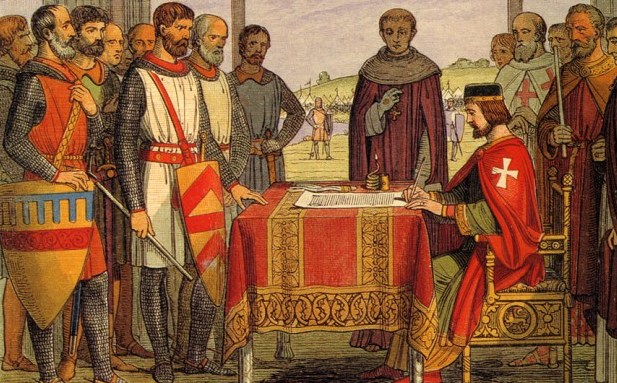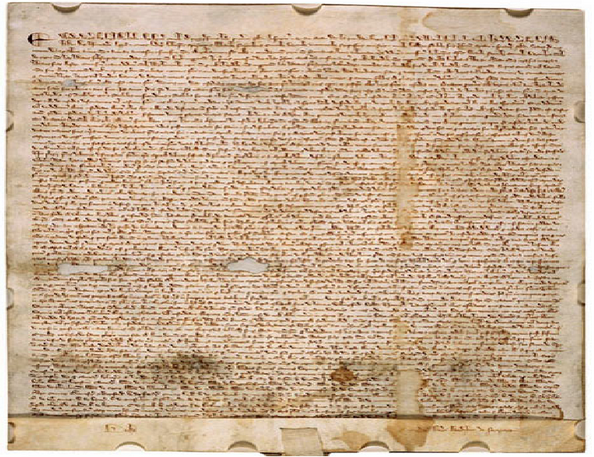
800 years ago, King John signed the Magna Carta, one of the most influential documents in the history of the Western World. Ralph Turner provides a fine analysis of how the document has been referred to over the past eight centuries, most recently by the US Supreme Court in rulings on Guantanamo (Boumediene v. Bush, 2008).
—
Book review: The Magna Carta through the Ages. By Ralph V. Turner. Routledge, 2003; 288 pages. U$ 57.95 (hardcover, amazon.com)
In August 1213, Archbishop of Canterbury Stephen Langton met with discontented barons at St. Paul’s, London, to negotiate their demands and draft a charter. The actual Magna Carta was signed in 1215, 800 years ago. This is how Ralph Turner’s excellent analysis of the Magna Carta begins, a document which was one of the earliest legal charters and which was to become an important herald of liberal thought.
The Magna Carta (Great Charter) required the king to declare a series of rights and respect legal procedures (such as habeas corpus), allowing “free men” (initially that meant only noble-men) to appeal against unlawful detention. During its first four centuries the document’s influence was confined to England and the British Isles, but later it contributed to the establishment of constitutional law in the English-speaking world. As Turner points out, it had a strong effect upon the constitutions and laws of the North American Colonies and the Federal Union after the American War of Independence. At the time, Massachusetts adopted a new seal depicting a man holding the Magna Carta. The essence of the Magna Carta is also reflected in the United States Bill of Rights, which established specific rights for citizens that limited government power: “No person shall be (…) deprived of life, liberty, or property, without due process of law.”
The document has thus been, indirectly, an important precursor to parliamentary sovereignty, democracy, and human rights. Several liberal scholars, such as Jeremy Bentham, in his Fragment on Government (1776), used and developed ideas articulated in the Magna Carta. The influence of the Magna Carta can thus be tracked all the way to the creation of today’s liberal Western World Order. Eleanor Roosevelt, one of the important proponents of human rights legislation in the 20th century, frequently referred to the Universal Declaration of Human Rights, adopted by the United Nations General Assembly in 1948, as a “Magna Carta for all mankind.”

As Turner points out, the Magna Carta was much more a ‘practical solution to political problems, not a statement of legal precepts.’ And yet, its importance cannot be underestimated: Clause 39 and 40 include that “no free man shall be arrested or imprisoned (…) or outlawed or exiled (…) except by the lawful judgement of his peers or by the law of the land” and “to no one will we sell, to no one will we refuse or delay right or justice.”
Turner skillfully tells the story about the circumstances that led to the Magna Carta’s creation. He provides the reader with a vivid impression of the constant struggle for power and money between the monarch and the barons. It becomes obvious that it was particularly King John’s obsessive search for funds for his military campaigns across the Channel against King Philip that made his subjects see him as an oppressor, as they were increasingly disinterested in the fate of France. While the financial burden on the barons had already become unsustainable during Richard Lionheart’s reign, it was perhaps John’s lack of military success that made him especially unpopular. Furthermore, John was unlucky enough to coincide with Pope Innocent III, one of the most aggressive and ambitious popes of the Middle Ages, with whom he famously clashed over the selection of the Archbishop of Canterbury. When John returned from yet another defeat in Normandy in 1214, he was entirely insolvent, severely limiting his options as the militant barons (and debtors) rose against him.
The document itself, 36 chapters long, deals with issues as diverse as criminal proceedings, financial matters, investigation into ‘evil customs’ enforced by royal foresters, and the removal of all foreign mercenaries from the kingdom. Most importantly, the Magna Carta called for the creation of a committee of twenty-five to ensure the king’s observance of the Charter. This last aspect proved impossible to implement under John, but reform-minded leaders such as Henry III took it up, reflecting its importance for future legislation.
A few months after the Charter’s implementation, Pope Innocent III annulled it, calling it “shameful, demeaning, illegal and unjust”. This again led to war between John and the rebels, who were defeated by royalist forces a year later. Yet King Henry III, John’s nine year old son, quickly reinstated the Charter, a document that would influence generations of liberal thinkers, both in Europe and in the New World.
Turner’s book serves as an ideal introduction to the topic. Yet while the document’s importance has been frequently recognized in the United States and the United Kingdom, it would have been interesting to know about reactions on a global scale. For example, as David Armitage writes in the Declaration of Independence: A Global History, the US Declaration of Independence – above all a declaration of rights – led to similar declarations across the world, including in newly independent nations such as Venezuela.
The year 2016 broke broke a series of sad records — regarding the number of journalists and bloggers detained and attacked, the number of NGOs harassed and the number of opposition politicians and activists killed. More governments than ever, many of them democratic ones, pass restrictive laws that stifle and threaten civil society. Almost half the world’s countries have implemented controls that affect tens of thousands of organizations across the globe, and others are likely to follow suit. They are by no means concentrated in one region of the world. Rather, speaking truth to power is dangerous in many places, like Cuba (where the governments routinely detains activists), Brazil (where several bloggers were assassinated recently), Egypt, Hungary, Israel, Russia, China, Thailand and several African countries, where gay rights activists are often killed with impunity. That makes Ralph Turner’s history of the Magna Carta all the more important.
Read also:
Book review: “Non-Western International Relations Theory” by Amitav Acharya and Barry Buzan (eds.)
Book review: “The Boxer Rebellion and the Great Game in China” by David J. Silbey
Book review: “Governing the World: The history of an idea” by Mark Mazower








